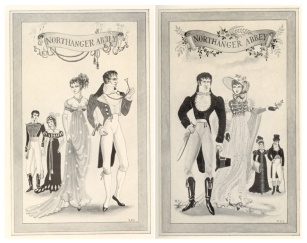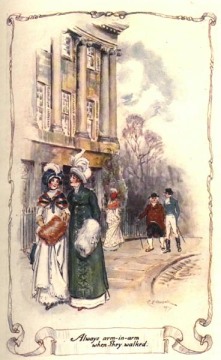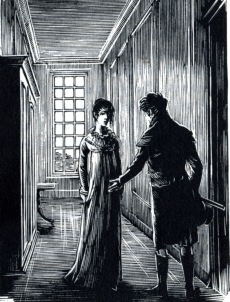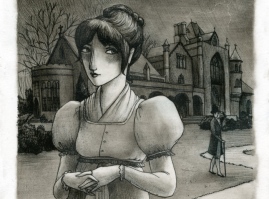 In Northanger Abbey, Jane Austen enters the conversation about novel-reading and whether or not it is harmful to young girls. She does this through through narrative asides as well as the character of Catherine Morland. One narrative aside defending novels comes early in the novel in Chapter 5 where Austen has just informed us that Catherine and Isabella often got together to discuss novels. “Yes, novels; for I will not adopt that ungenerous and impolitic custom so common with novel writers, of degrading by their contemptuous censure the very performances, to the number of which they are themselves adding–joining with their greatest enemies in bestowing the harshest epithets on such works, and scarcely every permitting them to be read by their own heroine, who, if she accidentally take up a novel, is sure to turn over its insipid pages with disgust.” And later in the same paragraph she further defends novels: “‘Oh! it is only a novel!’ replies the young lady…. in short, only some work in which the greatest powers of the mind are displayed, in which the most thorough knowledge of human nature, the happiest delineation of its varieties, the liveliest effusions of wit and humour are conveyed to the world in the best chosen language.” These sorts of comments are found interspersed in the novel, defending her own craft, and they reminded me a bit of Fielding’s own remarks on his work in Joseph Andrews. There is truth, these writers claim, in their fictitious worlds.
In Northanger Abbey, Jane Austen enters the conversation about novel-reading and whether or not it is harmful to young girls. She does this through through narrative asides as well as the character of Catherine Morland. One narrative aside defending novels comes early in the novel in Chapter 5 where Austen has just informed us that Catherine and Isabella often got together to discuss novels. “Yes, novels; for I will not adopt that ungenerous and impolitic custom so common with novel writers, of degrading by their contemptuous censure the very performances, to the number of which they are themselves adding–joining with their greatest enemies in bestowing the harshest epithets on such works, and scarcely every permitting them to be read by their own heroine, who, if she accidentally take up a novel, is sure to turn over its insipid pages with disgust.” And later in the same paragraph she further defends novels: “‘Oh! it is only a novel!’ replies the young lady…. in short, only some work in which the greatest powers of the mind are displayed, in which the most thorough knowledge of human nature, the happiest delineation of its varieties, the liveliest effusions of wit and humour are conveyed to the world in the best chosen language.” These sorts of comments are found interspersed in the novel, defending her own craft, and they reminded me a bit of Fielding’s own remarks on his work in Joseph Andrews. There is truth, these writers claim, in their fictitious worlds.
The best evidence of Austen’s defense for novels, though, is in the character of Catherine Morland.  She is the perfect Gothic heroine–reminiscent of Adeline in Romance of the Forest. Unlike Adeline, though, Catherine is uninterested in the sentimentality surrounding her; she is much more interested in anything “horrid”. She is independently minded and adventurous. When she is invited to stay at an Abbey with the Tilneys, Austen sets her on a path of seeming adventures that all end up having rather mundane ends. The secret manuscript in the closet is simply a laundry list, the giant chest contains blankets, even the mother, who Catherine imagines killed or hidden away by General Tilney, is found out to have died of natural causes surrounded by her two sons. Austen introduces one Gothic encounter after another only to tear down each one with practical explanations. When Catherine is caught, on her last adventure into the late Mrs. Tilney’s bedroom, by Henry, Austen sets us up for her lesson on what exactly the Gothic entails. Realizing that Catherine has been suspecting his father of murder, Henry explains, “Remember the country and the age in which we live. Remember that we are English, that we are Christians…. Does our education prepare us for such atrocities? … Could they be perpetrated without being known, in a country like this?” Here we’re given to understand that the Gothic really is foreign and could never take place somewhere as civilized as England. And if that were the end, we’d come away with a confirmed idea of the “Otherness” of the Gothic and the damages Gothic novels can do to the mind of a young girl.
She is the perfect Gothic heroine–reminiscent of Adeline in Romance of the Forest. Unlike Adeline, though, Catherine is uninterested in the sentimentality surrounding her; she is much more interested in anything “horrid”. She is independently minded and adventurous. When she is invited to stay at an Abbey with the Tilneys, Austen sets her on a path of seeming adventures that all end up having rather mundane ends. The secret manuscript in the closet is simply a laundry list, the giant chest contains blankets, even the mother, who Catherine imagines killed or hidden away by General Tilney, is found out to have died of natural causes surrounded by her two sons. Austen introduces one Gothic encounter after another only to tear down each one with practical explanations. When Catherine is caught, on her last adventure into the late Mrs. Tilney’s bedroom, by Henry, Austen sets us up for her lesson on what exactly the Gothic entails. Realizing that Catherine has been suspecting his father of murder, Henry explains, “Remember the country and the age in which we live. Remember that we are English, that we are Christians…. Does our education prepare us for such atrocities? … Could they be perpetrated without being known, in a country like this?” Here we’re given to understand that the Gothic really is foreign and could never take place somewhere as civilized as England. And if that were the end, we’d come away with a confirmed idea of the “Otherness” of the Gothic and the damages Gothic novels can do to the mind of a young girl.
 Austen, however, has other plans. Just a few chapters later General Tilney, having found out that Catherine isn’t rich, kicks her out of the house, alone, without money, in the middle of the night (well, she’s allowed to stay until the early morning)—not even a servant to keep her company or a carriage to take her home. Here is the only truly horrid, truly Gothic thing that happens in the novel, and it is perpetrated by an Englishman in England, and is not the result of novel-reading. I think Austen plays with all the conventions of the Gothic to emphasize this most atrocious of acts: the abandonment of an innocent girl for the most ridiculous of reasons: lack of money. Luckily Eleanor Tilney remembers to ask Catherine if she has enough money to get home, and so the happy ending—also a usual for Gothic novels—can come to pass. And Catherine–although an admitted novel reader, and a Gothic novel reader at that–is seen to not be at all damaged by what she read. She finds her way home all alone, and we can see that she was right in her suspicions about Northanger Abbey and General Tilney after all. Northanger Abbey, we find, was not a happy place, and General Tilney might not have killed his wife, but he could definitely be considered a villain in his own right.
Austen, however, has other plans. Just a few chapters later General Tilney, having found out that Catherine isn’t rich, kicks her out of the house, alone, without money, in the middle of the night (well, she’s allowed to stay until the early morning)—not even a servant to keep her company or a carriage to take her home. Here is the only truly horrid, truly Gothic thing that happens in the novel, and it is perpetrated by an Englishman in England, and is not the result of novel-reading. I think Austen plays with all the conventions of the Gothic to emphasize this most atrocious of acts: the abandonment of an innocent girl for the most ridiculous of reasons: lack of money. Luckily Eleanor Tilney remembers to ask Catherine if she has enough money to get home, and so the happy ending—also a usual for Gothic novels—can come to pass. And Catherine–although an admitted novel reader, and a Gothic novel reader at that–is seen to not be at all damaged by what she read. She finds her way home all alone, and we can see that she was right in her suspicions about Northanger Abbey and General Tilney after all. Northanger Abbey, we find, was not a happy place, and General Tilney might not have killed his wife, but he could definitely be considered a villain in his own right.
Maybe novel-reading actually helped Catherine out in the end, making her more astute about the world around her.

I think it’s interesting to say that Austen is defending her own craft. And I completely agree! I think at this time there is so much criticism towards women novelists. Many claimed that the novel is female because it conveys emotion and lacks reason (like women). Hence, ” it is only a novel.” I feel Austen is telling readers that novels encapsulate the “knowledge of human nature” and that indicates huge accomplishment on a female novelist’s part. After all, it’s women novelists then who are displaying “the greatest powers of the mind”! It’s interesting that although Austen is defending novel reading, she is still rooting for a certain type of novel reading: the domestic. I think she really sets the domestic novel in stone for the early 19th century novelists.
I also noticed how fascinated Catherine was with anything ‘horrid’ (the manuscript, the creepy castle, creepy Northanger Abbey, etc) however she made up most of the horribleness in her head. Northanger abbey is pleasant and the manuscript is a list of bills.
I agree that novel reading did help her to be more astute but it also harmed her. Like I discussed in class novels written during the 18th century were written to help readers become more skeptical. Bad characters intermingle with good ones and it is upon the reader to decipher who fits what role. Catherine seems to be doing this through the novel. While the General is not a murderer he isn’t a very nice person as you point out.
I like your classification of General Tilney as a “villain,” even though he hasn’t committed any crimes or murders or anything like that. His villainy is based on money. And though we mentioned in class that Austen certainly likes money, I think she is also wary of it as a primary motivation. Money, obviously, can become an obsession, and when it comes in the way of a young woman’s safety and actually puts her in a serious situation, then there is certainly some “villainy” involved, there.